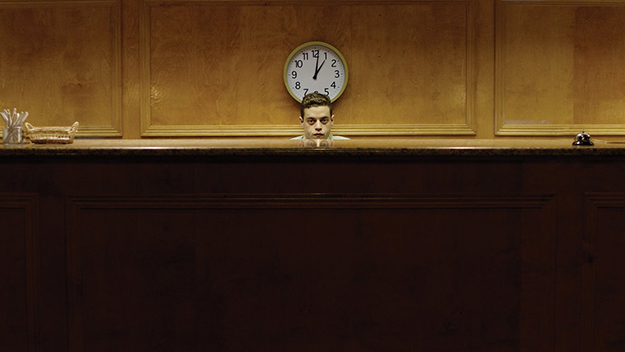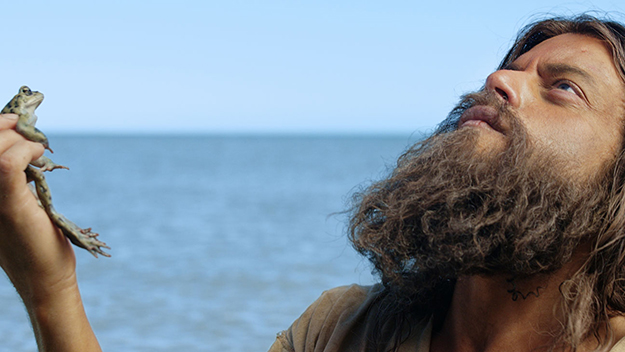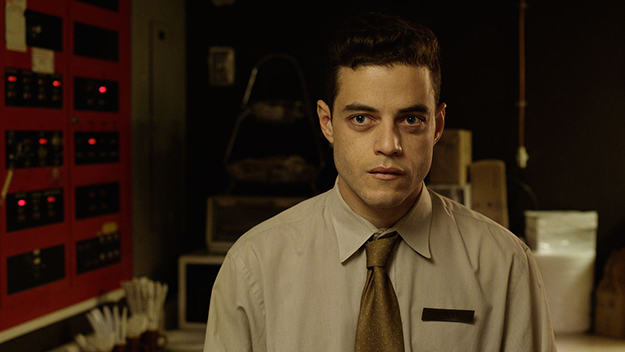Film of the Week: Buster's Mal Heart

Some reviews of Buster’s Mal Heart have used the term “science fiction,” which isn’t entirely off the mark—there are references to wormholes, bugs in the system, and footage of a TV boffin ranting about the possibility of finding peace at the center of a black hole. In her director’s note, Sarah Adina Smith says, “I like to make movies that have their cosmology,” but rather than cosmological in any scientific sense, you could call Buster’s Mal Heart more theological than anything. The opening use of Tom Waits’s sea-shantyish “Starving in the Belly of a Whale” tells us what’s afoot—a modern retelling of the biblical agonies of Jonah. It involves some very contemporary agonies, of course—the kind of existential dilemmas of self that have afflicted the soul-wracked heroes of movies such as The Shining and Fight Club.
In fact, Smith’s protagonist, played by Rami Malek, looks for much of the time as if he’s understudying for Leonardo DiCaprio in The Revenant. He’s a shaggy-locked, wild-bearded mountain man known as Buster, and when we first see him at the start trying to evade a manhunt—clean-shaven at this point, confusingly—we discover that he’s been drifting around the wooded slopes of Montana, breaking into vacant holiday homes and intermittently calling radio phone-in shows to rant incoherently about the coming “Inversion” that will affect us all (it’s a millennial affliction, as the film is set shortly before the end of the 1990s).
But Buster is also—or was, at some earlier point of his life—a hotel concierge of Hispanic origins named Jonah, seen at home with his young daughter Roxy (an impossibly engaging, uninhibited toddler named Sukha Belle Potter) and wife Marty (Kate Lyn Sheil), a recovering-addict daughter of strait-laced and generally disapproving (of Jonah) parents. Jonah isn’t easy to have around: he’s a loving, devoted father and spouse, but his nerves are increasingly frayed by the pressures of working nights, sleeping by day, and keeping himself aloft on excessive caffeine. He’s first seen in the hotel as a tiny figure dwarfed by the reception desk he sits behind, like a spare puppet that didn’t make the cut in Anomalisa. We also see him negotiating the hotel’s narrow corridors, placating disgruntled customers and, again looking tiny, carting huge tables across a cavernous ballroom in what appears to be a nod to a scene in Jerry Lewis’s The Bellboy.

Then along comes an odd customer who carries no credit card or ID, and seems to have no name, simply referring to himself as “the last free man,” which is how he’s listed in the credits. Played by DJ Qualls, and resembling a studious infant who hasn’t so much grown into adulthood as been weathered by a pickling process, the mystery drifter rants at Jonah about “the system” and the then-impending peril of the Y2K bug; priding himself on living outside the grid, he calls himself a freelance consultant of the sort that gets paid to keep quiet about the things They don’t want us to know, and a “roving exterminator”—that is, of the bugs in the system.
Jonah clearly considers him creepy and unreliable, but hey, who else is there to talk to at three in the morning? So the pair bond, and Jonah gets his head filled with apocalyptic ideas about the forthcoming Inversion (apparently a meteorological term, according to Wikipedia, but here signifying something weirder and darker, with ample ramifications for the film’s visual style). Qualls’s mystery man also inveigles Jonah into a plot to steal the jewelry of distracted hotel guests who are stuck there until they can reach their holiday homes.
Much later in the narrative’s time scheme, Jonah has cause to regret getting mixed up with his strange friend—although perhaps in some obscure way, he was already inextricably mixed up with him, through a process akin to quantum entanglement. Whatever the case, entanglement is altogether the game of this slippery, refined example of that troublesome quasi-genre the “mindfuck movie.” Using a very fragmented non-chronological timeline, the film splits Jonah into twin selves—the clean-cut, gauche, tender man-boy, and the shaggy, usually silent woodsman-ogre Buster. Bizarrely, Malek, who in any case looks vulnerably, candidly youthful as Jonah, looks even younger as Buster, like a 6-year-old done up in fancy-dress hair and beard, as if he’s gone to a fancy dress party as the Ancient Mariner.

Despite the attentions of Montana police, and the local TV announcers who present him to the public as some sort of semi-lovable yet incredibly dangerous marauding folk demon, it’s hard to think of Buster as being a genuine menace—not once we’ve seen him bumble around one of his temporary homes muttering to himself in English and Spanish and mysteriously turning every picture in the house upside down. But, in the end, a menace is what he is: there’s a blackly comic sequence in which he keeps an elderly couple (Sandra Ellis Lafferty and Nicholas Pryor) captive in their own home, tying them up with Christmas lights and feeding them a dinner he’s made them. Here he exudes both threat and a sort of perverse benevolence, and the sequence is also grimly poignant because the husband has Alzheimer’s: this, in a solemn twist, causes the police to register Buster’s presence. If only the film had managed to sustain this dramatic strength, Smith would really have been onto something. There’s also much sardonic humor that works nicely: a scene with Jonah’s bumptious hotel manager (Mark Kelly) who prides himself on having coined the word “staycation,” and a somewhat non-sequitur-ish but nicely tart conversation with a phone sex worker (voiced by Kate Berlant). “It’s coming,” says Jonah, meaning the Inversion. “You’re coming!” she fake-gasps. “No,” he corrects her, “it’s coming.”
Writer-director Smith, whose previous film The Midnight Swim (2014) I haven’t seen, makes quite a mark here as a stylist. Editing the film herself and maintaining an unsettlingly fractured staccato rhythm, she also weaves throughout a striking visual shorthand for the malaise afflicting Jonah: exaggerated symmetries and images of splitting and duality, like a frame divided between black sea and orange sky. She also favors abrupt, eccentric juxtapositions—cutting from a boat on a blue ocean to a slice of pizza bobbing in a swimming pool—and compiles a profoundly unconventional soundtrack that takes in an eerie “Auld Lang Syne,” Sousa brass music, a children’s choir, and a Spanish-language cover of Boney M (“Rios de Babilonia”).
You have to applaud a filmmaker who likes to take—remembering that forking-path image—the road less travelled, and Smith’s eccentricity begins with the film’s barely inexplicable, if not altogether memorable title (“Buster” turns out to be partly a bilingual pun, but “mal heart”? Am I missing something obvious?). But it’s a fine line between authentic philosophical dissidence (or dissonance) and recherché stylistic goofiness, and even as fine-tuned a mind as Charlie Kaufman hasn’t always been able to walk that line convincingly. Smith’s own balancing act doesn’t entirely convince; there’s a point in Buster’s Mal Heart at which you find yourself thinking, Ohhhh, I get it now… and that’s where the film’s strangeness starts to wear thin and look more like forced oddity.

Fortunately, Smith has a baseline on which to ground the strangeness, and that’s the presence of her actors. One would hate to go all humanistic and imply that a film’s fanciful abstraction will only work if you also have honest-to-goodness folks being folks—but in a way that is what holds Buster’s back from the brink of being just a consummately polished conceit. The intensely snaky Qualls—in an understated way, as fundamentally grubby a screen presence as Scoot McNairy or Ben Mendelsohn at their rattiest—and Malek’s befuddled ingénue, with his weary frog-baby eyes and that incongruously jutting puppet-ish jaw, ensure a human immediacy that the film’s formal elaboration sometimes militates against. You’d hate to suggest that Smith lighten up in her next movie—that sounds too much like suggesting she play it straight, which I hope she won’t. Still, she could afford to relax a little. Hotel workers on the night shift, meanwhile, should avoid watching this, unless they have ample daylight hours logged in for recuperation.
Jonathan Romney is a contributing editor to Film Comment and writes its Film of the Week column. He is a member of the London Film Critics Circle.




